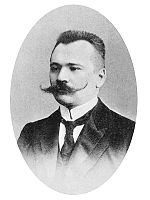Alexander Vasiliev (historian), Date of Birth, Place of Birth, Date of Death
TweetAlexander Vasiliev (historian)
American historian
 Date of Birth: 22-Sep-1867
Date of Birth: 22-Sep-1867
 Place of Birth: Saint Petersburg
Place of Birth: Saint Petersburg
Date of Death: 30-May-1953
Profession: historian, arabist, university teacher, orientalist, byzantinist
Nationality: United States
Zodiac Sign: Virgo 
About Alexander Vasiliev (historian)
- For other persons of a similar name, see Alexander Vasilyev (disambiguation). Alexander Alexandrovich Vasiliev (Russian: ??????´??? ??????´??????? ????´????; 4 October 1867 (N.S.) – 30 March 1953) was considered the foremost authority on Byzantine history and culture in the mid-20th century.
- His History of the Byzantine Empire (vol.
- 1–2, 1928) remains one of a few comprehensive accounts of the entire Byzantine history, on the par with those authored by Edward Gibbon and Fyodor Uspensky. Vasiliev was born in Saint Petersburg.
- He studied under one of the earliest professional Byzantinists, Vasily Vasilievsky, at the University of St Petersburg and later taught Arabic language there.
- Between 1897 and 1900, he furthered his education in Paris.
- In 1902, he accompanied Nicholas Marr in his trip to Saint Catherine's Monastery in Sinai. During his stay at the Tartu University (1904–12), Vasiliev prepared and published a highly influential monograph, Byzantium and the Arabs (1907).
- He also worked in the Russian Archaeology Institute, established by Fyodor Uspensky in Constantinople.
- In 1912, he moved to the St Petersburg University as a professor.
- He was elected to the Russian Academy of Sciences in 1919. In 1925, during his visit to Paris, Vasiliev was persuaded by Michael Rostovtzeff to emigrate to the West.
- It was Rostovtzeff who ensured a position at the University of Wisconsin–Madison for him.
- Several decades later, Vasiliev moved to work in Dumbarton Oaks.
- Towards the end of his life, he was elected President of the Nikodim Kondakov Institute in Prague and of the Association Internationale des Études Byzantines.
Read more at Wikipedia
See Also
- Famous People's Birthdays on 22 September, United States
- Famous People's Birthdays in September, United States
- Famous historian's Birthdays on 22 September, United States
- Famous historian's Birthdays in September, United States
- Famous arabist's Birthdays on 22 September, United States
- Famous arabist's Birthdays in September, United States
- Famous university teacher's Birthdays on 22 September, United States
- Famous university teacher's Birthdays in September, United States
- Famous orientalist's Birthdays on 22 September, United States
- Famous orientalist's Birthdays in September, United States
- Famous byzantinist's Birthdays on 22 September, United States
- Famous byzantinist's Birthdays in September, United States

